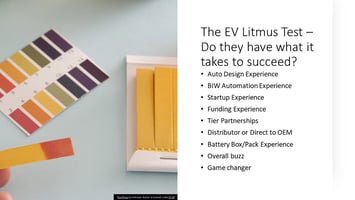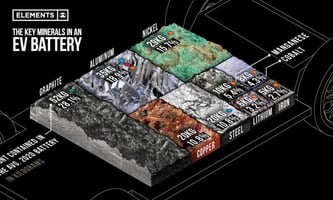One downside to electric vehicles is that they can be vulnerable to water damage. If the car gets...
The AV Race: Who's Winning and Losing?

The world of automobiles is constantly changing, with new technology and innovations being introduced every day. One of the latest developments is the introduction of autonomous vehicles (AV), which has the potential to revolutionize the way we travel. However, the AV race is only happening with setbacks. While most of the world is focused on EV development and growth, we still need robot tax fleets in mass production. China announced an all-autonomous vehicle highway, which may be the only way it will ever work, but GM's cruises just got banned in California. Tesla FSD has yet to convert to anything real, including Elon's boring company and the Vegas loop. Instead of robot drivers, it's human drivers of Tesla's moving about 20 miles an hour. 
Here's an update on all the efforts in the world:
1. Tesla FSD: Tesla has been making headlines for their self-driving efforts and the progress they've made in the FSD software. However, despite having the technology in place, Tesla still has far to go before they can convince regulators of the safety of their AVs. Tesla has also faced criticism for their approach to handling driver distractions, with many safety experts calling for more regulation. However, the company seems confident in its technology and is pushing forward with its AV development.
2. GM Cruise: GM Cruise has been one of the pioneers in the AV space, and their efforts have been praised by many. However, they recently faced a significant setback when the California DMV revoked their permit to test AVs because of safety concerns. The company argued that the DMV's concerns were misplaced and that their AVs were not any less safe than traditional vehicles, but the DMV did not relent. GM Cruise has continued its development despite the setback and has even begun testing AVs in other countries.
3. Waymo: Waymo, Google's self-driving car project, has been one of the leaders in the AV race for years. They have been testing AVs on public roads in several cities across the US, and they recently announced that they would be opening up their autonomous ride-hailing service to the public in Phoenix. The move is a significant step forward for Waymo and the AV industry as a whole.
 4. Zoox: Zoox is an OG in the AV space, but they have been making significant progress since being acquired by Amazon. The company has developed its own AV platform and is testing its vehicles on public roads in California. They recently unveiled their robotaxi prototype, which is fully electric and capable of level 5 autonomy. The company has already secured over $1 billion in funding and is positioning itself as a significant player in the AV space.
4. Zoox: Zoox is an OG in the AV space, but they have been making significant progress since being acquired by Amazon. The company has developed its own AV platform and is testing its vehicles on public roads in California. They recently unveiled their robotaxi prototype, which is fully electric and capable of level 5 autonomy. The company has already secured over $1 billion in funding and is positioning itself as a significant player in the AV space.
5. BYD: BYD, a Chinese automaker, has been in the AV space. The company has developed its own AV technology and has been testing it on public roads in China. They recently announced that they would be launching a fleet of autonomous taxis in Shenzhen, China. It's a significant step forward for BYD and the AV industry as a whole.
6. Mercedes: Mercedes has struggled in the AV space, particularly with their Mercedes-Benz F 015 concept car. The car is fully autonomous and can be controlled via voice commands, gestures, and touchscreens. Mercedes has also been working on developing AV technology for commercial vehicles, such as trucks and buses.
7. Geely: Geely, a Chinese automaker, is a significant player in the AV space. The company has developed its own AV technology and has been testing it on public roads in China. They recently announced that they would be launching a fleet of autonomous taxis in Chengdu, China. It's a significant step forward for Geely and the AV industry as a whole.
8. Cadillac: Cadillac has been making significant progress in the AV space, particularly with its Super Cruise system. The system is capable of level 2 autonomy and allows drivers to go hands-free on the highway. Cadillac has also been developing more advanced AV technology, which they plan to integrate into their vehicles in the coming years.
9. Tusimple: Tusimple is a Chinese AV startup that specializes in developing technology for autonomous trucks. The company has been testing its trucks on public roads in China and the US and has developed partnerships with major logistics companies. Tusimple is positioning itself as a significant player in the AV trucking space.

The AV race is heating up, with several players making significant progress in the development of their AV technology. Despite setbacks and regulatory hurdles, companies like Tesla, GM Cruise, Waymo, Zoox, BYD, Mercedes, Geely, Cadillac, and Tusimple are pushing forward with their AV development. However, the major issue with robot cars will be the humans they interact with. We are the unknown that AI can't adjust for, and so for this EV enthusiast, it's an all or nothing thing in terms of who gets to share the road. While we may still need robot taxi fleets in mass production, the progress being made is significant, and it's only a matter of time before autonomous vehicles become the norm. With safety as their top priority, AV manufacturers are committed to delivering a future where the roads are safer and more efficient. Companies like UBER have bet big on this market, and they could go belly up if it doesn't hurry.


